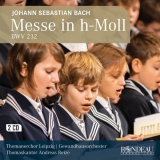2021 übernahm der Schweizer Andreas Reize als Nachfolger von Georg Christoph Biller das Amt des Thomaskantors in Leipzig und legt nun mit Bachs h-Moll-Messe seine erste Einspielung mit den Thomanern vor. Es ist ein perfekter Einstand geworden.
Andreas Reize nutzt die Freiräume, die Bach in seiner durchdachten musikalischen Architektur bietet, wunderbar aus. Er setzt seinen Chor in unterschiedlicher Besetzung ein und schafft derart ein sehr abwechslungsreiches und gleichzeitig plastisches Klangbild. Dem gegenüber steht ein Solisten-Quintett, das ideal aufeinander abgestimmt ist und sich anstandslos in den großen Spannungsbogen vom Kyrie bis hin zum Dona nobis pacem einfügt.
Barocke Pracht, wie sie etwa im Eingangschor des Gloria findet, alterniert sehr stimmig mit intimeren, kontemplativen Momenten (Et incarnatus/Crucifixus im Credo). Andreas Reize überspannt dabei nie den Bogen. Affektiertheit, künstlerische Eitelkeiten sind nicht sein Ding. « Conditio sine qua non“ sind für den 18. Nachfolger von Bach als Thomaskantor « stets große Bögen, die sich Stützpfeilern und Streben gleich durch die komplette Architektur eines Werks ziehen“, heisst es im Booklet. Dies gelingt durch eine geschmeidige, leichte, filigrane und federnde Tongebung, sei es in den kurzen instrumentalen kammermusikalischen Episoden (Laudamus te im Gloria), sei es in den feinen, sehr reliefartigen chorischen Fugen, sei es in den introspektiven Solo-Passagen (Qui sedes ad dexteram Patris im Credo).
Hier wurde ein Ensemble musikalisch und inhaltlich mustergültig aufeinander abgestimmt, das die spirituelle Tiefe der h-Moll-Messe mit Würde, Respekt und höchstem künstlerischen Anspruch auslotet.
In 2021, the Swiss Andreas Reize succeeded Georg Christoph Biller as Thomaskantor in Leipzig and now presents Bach’s Mass in B Minor, his first recording with the St. Thomas Boys Choir. It has become a perfect debut.
Andreas Reize makes wonderful use of the freedom Bach offers in his well thought-out musical architecture. He uses his choir in different ensembles and thus creates a very varied and at the same time vivid performance. This is contrasted by a quintet of soloists who are ideally attuned to each other and who perfectly fit without into the great arc of tension from the Kyrie to Dona nobis pacem.
Baroque splendor, as found in the opening chorus of the Gloria, alternates very harmoniously with more intimate, contemplative moments (Et incarnatus/Crucifixus in the Credo). Andreas Reize never oversteps the mark. Affectation, artistic vanity are not his thing. « Conditio sine qua non » for Bach’s 18th successor as Thomaskantor are « always large arches that run like buttresses and struts through the complete architecture of a work, » it says in the booklet. This succeeds through a supple, light, filigree and springy tone, whether in the short instrumental chamber music episodes (Laudamus te in the Gloria), whether in the fine, very relief-like choral fugues, whether in the introspective solo passages (Qui sedes ad dexteram Patris in the Credo).
Here an ensemble has been perfectly matched musically and in terms of content, exploring the spiritual depth of the B minor Mass with dignity, respect and the highest artistic standards.






















